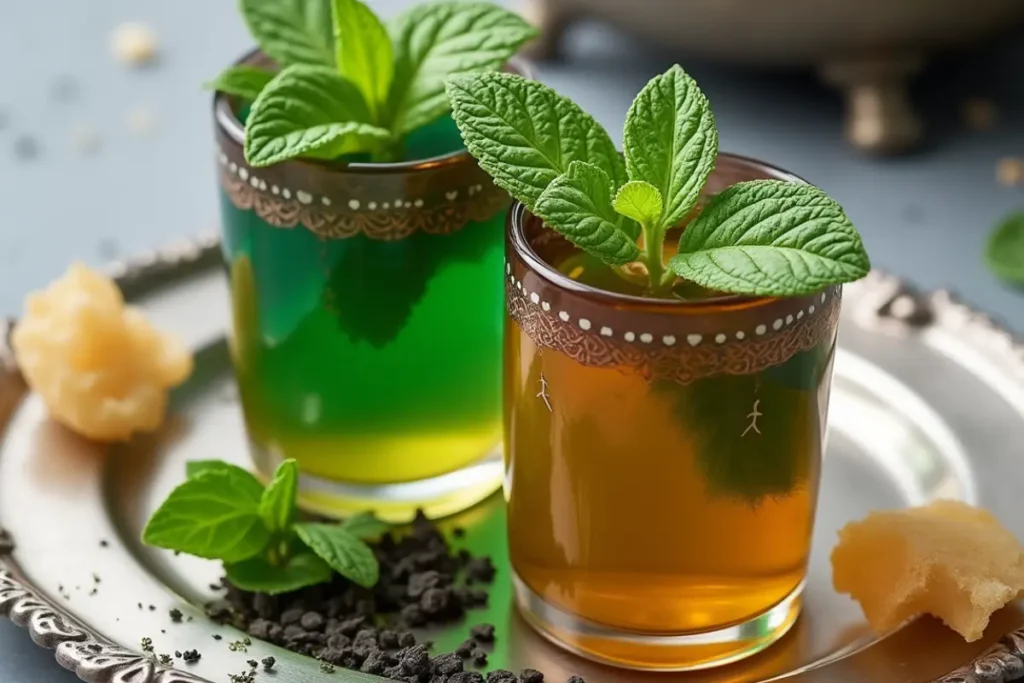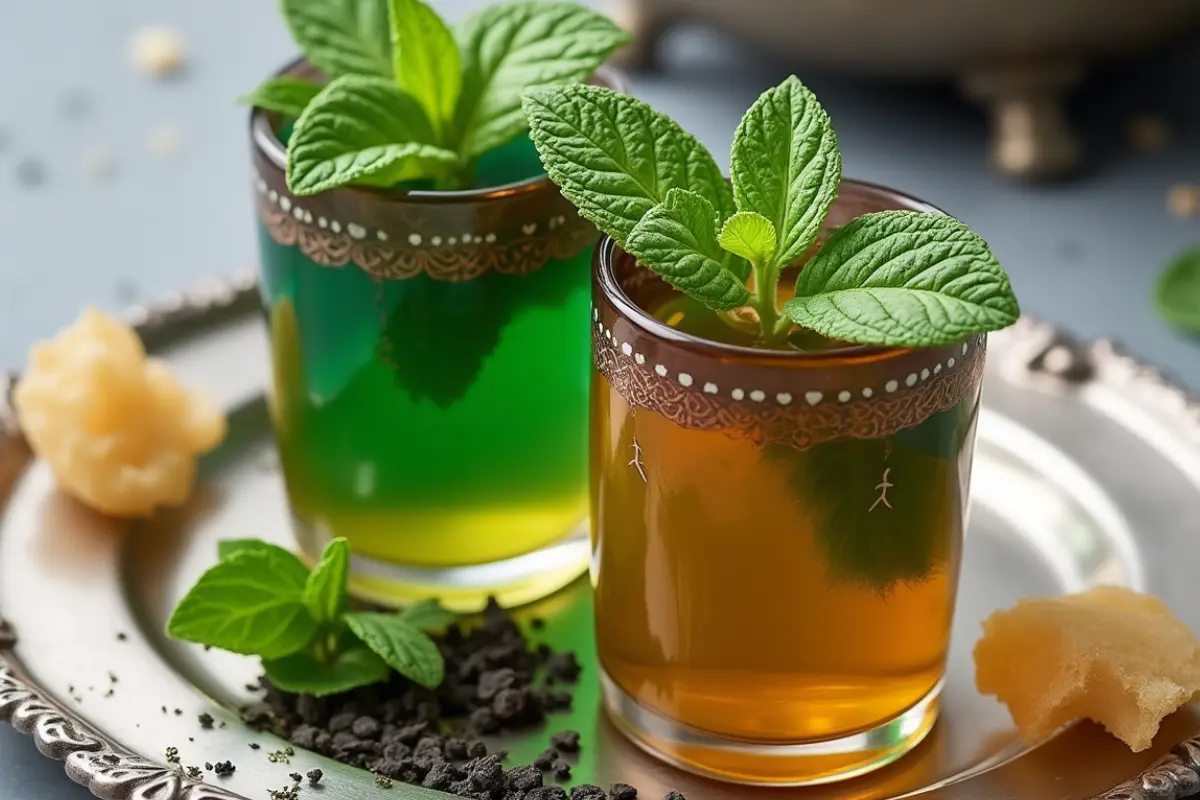
Table of Contents
Nothing soothes quite like a steaming cup of minted tea: fresh spearmint leaves steeped quickly to capture their natural menthol lift. After experimenting with three leaf-to-water ratios, I found the sweet spot that keeps the brew vibrant, never bitter—ready in five minutes for morning focus or evening unwind.
What is Minted Tea?
At its core, minted tea is a refreshing herbal infusion made from mint leaves. While some variations use fresh mint, others rely on dried leaves to create a similar flavor. Unlike standard teas that come from the Camellia sinensis plant, this tea is entirely herbal, making it a caffeine-free option for those who want a soothing and natural beverage.
Types of Mint Used in Minted Tea
There are several varieties of mint that can be used to make minted tea. Each type has a slightly different taste and health benefits:
- Peppermint – Known for its bold, cooling flavor and high menthol content.
- Spearmint – Milder and slightly sweeter than peppermint, often used in Moroccan mint tea.
- Nana Mint – A traditional variety from North Africa, commonly found in Moroccan tea blends.
- Chocolate Mint – A unique hybrid with subtle cocoa undertones.
- Apple Mint – A delicate variety with a hint of fruitiness.
Natural vs. Blended Minted Tea
While pure minted tea consists only of mint leaves, many commercial blends mix it with other ingredients to create different flavors and effects:
- Green Tea & Mint – Common in Moroccan tea, blending fresh mint with gunpowder green tea.
- Mint & Lemon – A refreshing and detoxifying combination.
- Mint & Ginger – A warming blend known for its digestive benefits.
Why is Minted Tea Popular?
The cooling sensation of minted tea makes it a favorite, especially in warm climates. Many people enjoy it for its ability to:
- Aid digestion and soothe stomach discomfort.
- Provide a natural energy boost without caffeine.
- Help with relaxation due to its calming properties.
Moreover, research has shown that mint contains antioxidants that support overall health. In fact, according to a study published in the National Center for Biotechnology Information (NCBI), mint has anti-inflammatory properties that may aid digestion and support immune health.
If you love trying different herbal teas, you may also enjoy this raspberry leaf tea guide, which explores another caffeine-free alternative with wellness benefits.
Types of Minted Tea
With its refreshing taste and soothing properties, minted tea comes in many forms, each offering a unique experience. While some varieties are purely herbal, others combine mint with different ingredients to create distinct flavors and benefits. Understanding the different types can help you find the perfect cup to match your preferences.
1. Pure Minted Tea
For those who love the clean, crisp flavor of mint, pure minted tea is the best choice. It is made using fresh or dried mint leaves, without any additional ingredients. This simple infusion is:
- Naturally caffeine-free, making it a great evening drink.
- Refreshing and light, with a cooling aftertaste.
- Packed with antioxidants, which may support digestion and relaxation.
2. Moroccan Mint Tea
A staple in North African culture, Moroccan mint tea is a bold and sweet blend of gunpowder green tea, fresh mint leaves, and sugar. This variety is:
- A symbol of hospitality, often served to guests.
- Stronger in flavor, thanks to the robust green tea base.
- Enjoyed throughout the day, both as a social drink and a digestive aid.
3. Peppermint vs. Spearmint Tea
While both peppermint and spearmint are used in minted tea, they have distinct differences:
- Peppermint Tea – Stronger, with a high menthol content that creates a cooling sensation.
- Spearmint Tea – Milder, slightly sweet, and often preferred for its softer taste.
4. Mint-Infused Herbal Blends
Many herbal teas incorporate mint for added freshness and health benefits. Some popular combinations include:
- Mint and Lemon – A detoxifying drink with a zesty twist.
- Mint and Ginger – Warming and soothing, great for digestion.
- Mint and Chamomile – A calming blend, perfect for bedtime.
5. Iced Minted Tea
For a cooling alternative, iced minted tea is a popular choice, especially in warm weather. It is:
- Hydrating and refreshing, ideal for summer days.
- Easy to prepare, by simply chilling brewed mint tea.
- Enhanced with fruits, such as lemon or berries, for extra flavor.
Regardless of the type, minted tea offers a delightful and versatile drinking experience. Whether you prefer it hot or iced, pure or blended, there is a perfect variety for every taste.
How to Make Minted Tea at Home
Making minted tea at home is both simple and rewarding. Whether you prefer a traditional hot brew or a refreshing iced version, the process is easy to customize. By using fresh ingredients and the right steeping techniques, you can enhance the flavor and maximize the benefits of this delightful tea.
1. Traditional Moroccan Mint Tea Recipe
Moroccan minted tea is well-known for its bold flavor and cultural significance. To make an authentic version, follow these steps:
Ingredients:
- 1 tablespoon gunpowder green tea
- 1 handful fresh mint leaves (spearmint or nana mint)
- 2–3 tablespoons sugar (adjust to taste)
- 2 cups boiling water
Instructions:
- Add green tea to a teapot and pour in a small amount of boiling water to rinse the leaves. Swirl and discard the water.
- Pour the remaining hot water over the tea and let it steep for 2–3 minutes.
- Add fresh mint leaves and sugar to the teapot.
- Stir well or pour the tea back and forth between teapots to mix the flavors.
- Serve in small glasses, pouring from a height to create a light froth.
2. Simple Fresh Mint Tea Recipe
For a lighter and caffeine-free version, try this fresh minted tea recipe:
Ingredients:
- 1 handful fresh mint leaves
- 2 cups hot water
- 1 teaspoon honey (optional)
- 1 slice lemon (optional)
Instructions:
- Rinse fresh mint leaves and place them in a teapot or cup.
- Pour hot water over the leaves and let steep for 5–7 minutes.
- Strain and serve with honey or lemon for extra flavor.
3. Cold Brew Minted Tea (Iced Version)
Perfect for summer, cold brew minted tea is refreshing and effortless to make.
Steps to Prepare:
- Add fresh mint leaves to a pitcher of cold water.
- Let it infuse in the refrigerator for 6–8 hours.
- Strain and serve over ice for a cool, hydrating drink.
4. Enhancing Minted Tea with Extra Ingredients
To customize your minted tea, consider adding:
- Ginger – Adds warmth and helps digestion.
- Cinnamon – Provides a hint of spice and balances blood sugar.
- Lemon or Lime – Enhances the refreshing citrusy notes.
- Honey or Agave – Sweetens naturally without refined sugar.
By experimenting with different ingredients and techniques, you can create the perfect cup of minted tea to suit any occasion. Whether you crave a warm, comforting brew or a cool, revitalizing drink, homemade minted tea is always a great choice.
FAQs About Minted Tea
1. What Is Mint Tea Good For?
Minted tea supports digestion by relieving bloating and stomach discomfort, reduces stress with its calming aroma, and aids respiratory health by clearing nasal passages and soothing sore throats. It also provides hydration as a refreshing, caffeine-free option.
2. Is Mint Tea Just Mint Leaves?
Not always. While some varieties use only fresh or dried mint leaves, others combine mint with green tea, black tea, or other herbs.
3. Why Do They Drink Mint Tea in Morocco?
In Morocco, minted tea is a symbol of hospitality and tradition. It is served to welcome guests as a sign of respect, enjoyed at social gatherings with family and friends, and valued for its refreshing and soothing qualities, blending green tea with mint.
4. Is It Okay to Drink Peppermint Tea Every Day?
Yes! Drinking peppermint tea daily is generally safe and beneficial. Since it is naturally caffeine-free, it can be enjoyed at any time.
5. What Is the Best Time to Drink Minted Tea?
Minted tea can be enjoyed anytime, but certain times enhance its benefits. Drinking it in the morning provides a refreshing start, after meals aids digestion and reduces bloating, and before bed promotes relaxation and soothes the body.
Conclusion & Final Thoughts
Minted tea is more than just a delicious and refreshing beverage—it is a drink with a rich history, numerous health benefits, and incredible versatility. Whether you enjoy it for its soothing properties, digestive support, or cultural significance, this herbal tea is a wonderful addition to any daily routine.
One of the greatest advantages of minted tea is its adaptability. You can enjoy it hot for warmth and relaxation or serve it iced for a cooling and hydrating drink. Additionally, the variety of mint types—from peppermint to spearmint and Moroccan mint—allows you to explore different flavors and experiences.
Beyond taste, the health benefits of minted tea make it a great choice for anyone looking for a natural way to support well-being. It can aid digestion, relieve stress, improve respiratory health, and provide a caffeine-free alternative to traditional teas. Furthermore, its hydrating and refreshing qualities make it a perfect drink at any time of the day.
Incorporating minted tea into your lifestyle is simple and rewarding. With so many brands, blends, and homemade preparation methods available, you can easily find a version that suits your preferences. So whether you’re looking for a moment of calm, a digestive boost, or a flavorful new tea to try, minted tea is a fantastic choice that brings both enjoyment and wellness in every sip.

Minted Tea
Ingredients
- 1 tbsp gunpowder green tea
- 1 handful fresh mint leaves spearmint or nana mint
- 3 tbsp sugar adjust to taste
- 2 cups boiling water
Instructions
- Add green tea to a teapot and pour in a small amount of boiling water to rinse the leaves. Swirl and discard the water.
- Pour the remaining hot water over the tea and let it steep for 2–3 minutes.
- Add fresh mint leaves and sugar to the teapot.
- Stir well or pour the tea back and forth between teapots to mix the flavors.
- Serve in small glasses, pouring from a height to create a light froth.
- Simple Fresh Mint Tea Recipe
- For a lighter and caffeine-free version, try this fresh minted tea recipe
